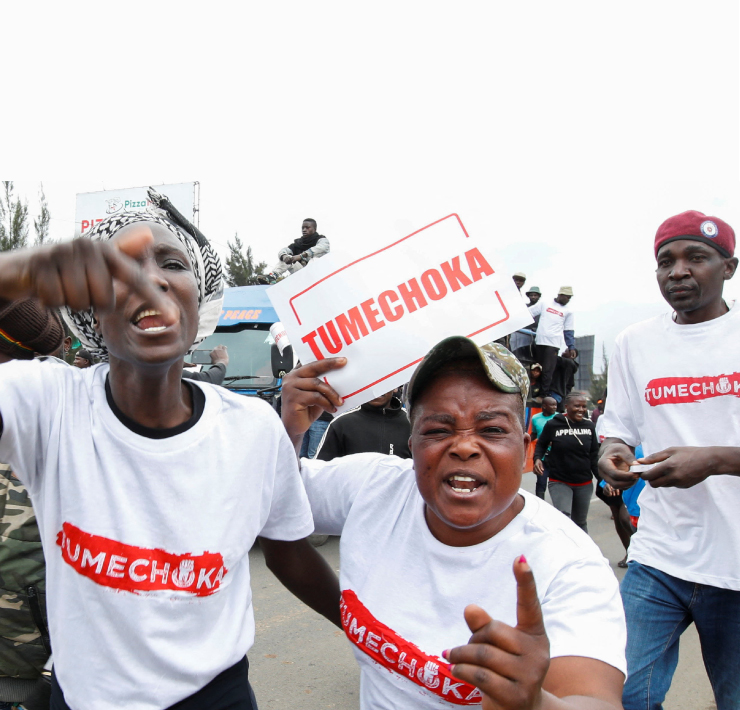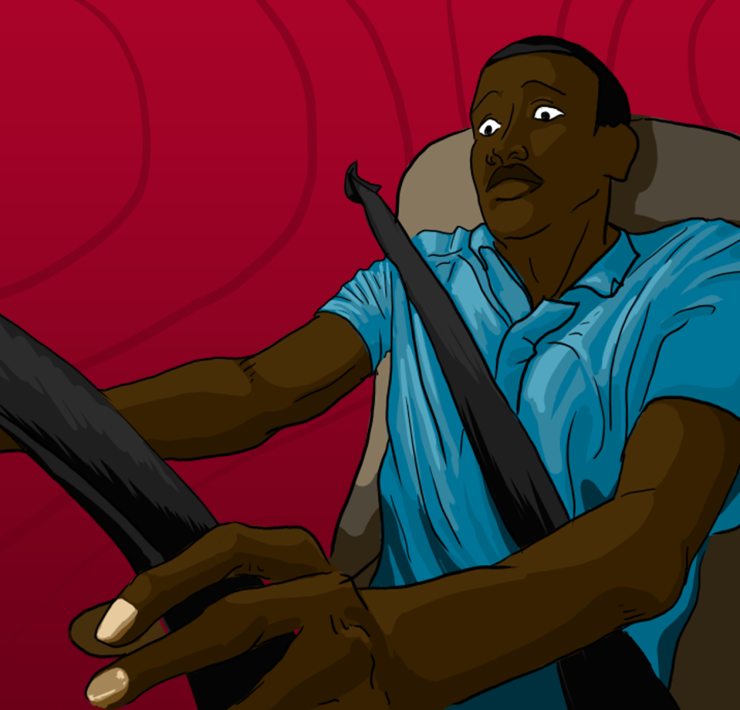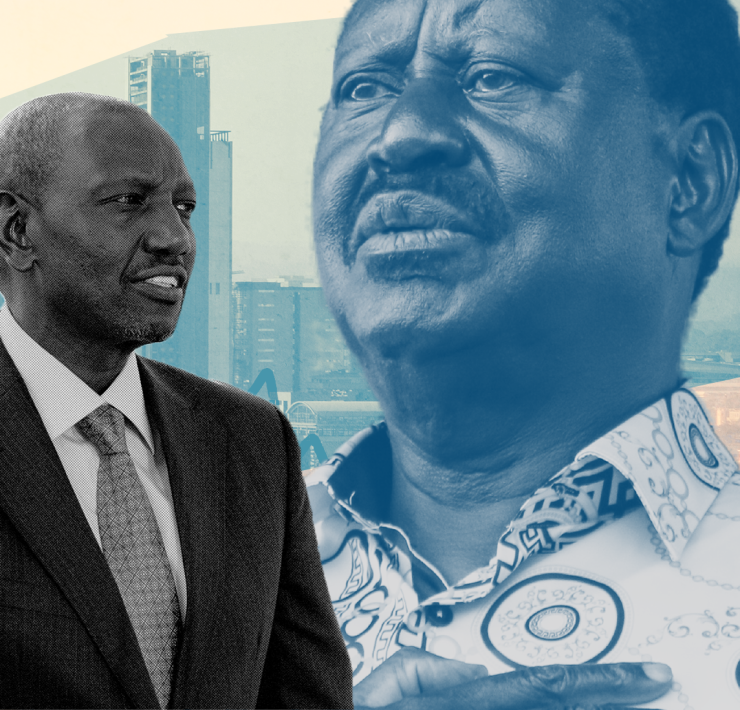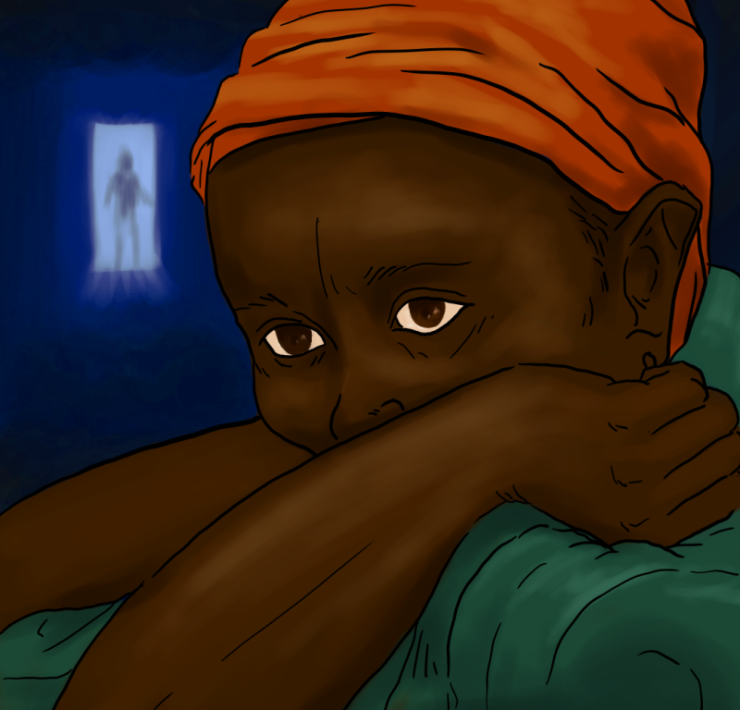One of the most significant aspects of the Saba Saba protests this month was that for the first time since the pro-democracy protests of the 1990s, Kenyans were rallying around issues rather than personalities or ethnic groups, in this case, punitive taxes and the commensurate rise in the cost of living. This demonstrates that Kenyans have finally reached a level of political maturity where issues, rather than personalities or ethnic groups, determine the support leaders get.
It is not surprising that opposition leader Raila Odinga can still draw in massive crowds despite his rapprochement with Uhuru Kenyatta. But these protests were not about showing support for Raila; they were about Kenyans fighting for their lives because extortionist taxes supported by a much-loathed Finance Bill have made their lives unbearably hard. Kenyans were gathering in Kamukunji and in many towns across the country because their grievances have now become very personal.
The truth of the matter is that the “hustlers” that President William Ruto promised to support are feeling a deep sense of betrayal. They believe they were lied to. Prior to the elections, Ruto promised them that, unlike his predecessor Uhuru Kenyatta, he would economically emancipate the little guys, the so-called hustlers. But soon after assuming office, President Ruto broke every promise he made to those who supported him. A Finance Bill that will hurt every Kenyan financially has been passed despite Kenyans’ overwhelming rejection of it. It has now emerged that opposition MPs were bribed to pass the Bill, which goes to show the quality of our leadership both within government and in the opposition. The level of discontent and shock in the country is palpable.
If nothing else, Kenyans now know that when a leader says he will support and protect them, he doesn’t mean it. For more than two decades, Kenyans have been hoodwinked into believing that a person from their ethnic group would safeguard the group’s interests, even though it is abundantly evident that once an ethnic kingpin assumes office, he is only interested in safeguarding his own interests and the interests of his relatives and cronies. This blind ethnic loyalty has led to the “tyranny of numbers” determining the outcome of elections.
However, the last election was unique in that Ruto managed to convince the Kikuyu, Kenya’s largest ethnic group, that despite his Kalenjin background, he would do more for the Kikuyu than the departing president, Uhuru Kenyatta, who happened to be Kikuyu and who was supporting Raila Odinga. The Kikuyu felt that Uhuru had betrayed them for presumably continuing to hoard economic opportunities and businesses for his family and cronies and not helping the small businesses and farmers in Central Kenya.
Prior to the 2022 election, a Kikuyu taxi driver told me that the majority of Kikuyus would vote for Ruto because they want to fulfill the promise Kenyatta made (and then broke) to Ruto to support him for the presidency in the 2022 presidential election. Uhuru’s “handshake” with opposition leader Odinga was another betrayal that needed to be remedied, he said.
However, my personal opinion is that Kikuyus voted out of fear. Having suffered massively during the post-election violence of 2007/8, the Kikuyus did not want to risk a scenario where their perceived electoral choice would lead to the kind of violence that saw hundreds of thousands of Kikuyus evicted from the Rift Valley. Voting for Ruto was an act of self-preservation.
Since independence, two ethnic groups – the Kikuyu and the Kalenjin – have held the presidency of the country. This had led to a situation where anybody from another ethnic group seeking the presidency is viewed as a threat to the dominance of these two groups. The politics of exclusion that has defined Kenyan politics has also engendered high levels of impunity. People implicated in crimes are protected because of their ethnicity, a situation that has entrenched corruption in government. Levels of impunity skyrocketed during the UhuRuto regime, with mega corruption scandals becoming the order of the day.
President Ruto claims that he had nothing to do with the bad decisions made by his predecessor but, as one newspaper’s headline indicated, the current president seems to be following in the footsteps of Kenyatta. Like Kenyatta, Ruto is showing disdain for court orders and the constitution. He is rewarding loyalists with lucrative government positions even though some of these people have been implicated in corruption scandals. And like Uhuru, Ruto is going on a reckless borrowing spree that will see Kenya’s already unsustainable debt rise exponentially. Poverty and unemployment levels are also set to escalate because of the new taxes.
While it is generally acknowledged that no Kenyan government since independence has had a clean record, levels of impunity in this government seem to have reached unprecedented heights. Moreover, we seem to be heading back to the days of roadside declarations by the president being construed as the law. This is the road to anarchy and dictatorship. Kenyans have been there before; they know what it can do to a country, and they don’t want to go there again.
The Saba Saba protests demonstrated that the majority of Kenyans still believe in democracy and the rule of law. This is a very healthy and hopeful sign.
Author
-

Rasna Warah is a Kenyan writer and journalist with over two decades of experience as an editor, writer and communications specialist. She wrote a weekly op-ed column for the Daily Nation, Kenya’s leading newspaper, for many years, and has contributed to various regional and international publications, including, the UK’s Guardian, Africa is a Country, The East African, The Mail and Guardian, The Elephant, and Kwani? She has worked as an editor and writer at the United Nations Human Settlements Programme (UN-Habitat) and has published two books on Somalia: Mogadishu Then and Now (2012) and War Crimes (2016). Her first book, Triple Heritage (1998), explored the history of South Asians in East Africa. Her latest book, Lords of Impunity (2022), examines the failures and internal contradictions of the United Nations and what can be done to transform this global body. She holds a Master’s degree in Communication for Development from Malmö University in Sweden and a Bachelor of Science Degree in Psychology and Women’s Studies from Suffolk University in Boston, USA. She is based in Nairobi, Kenya.
Rasna Warah is a Kenyan writer and journalist with over two decades of experience as an editor, writer and communications specialist. She wrote a weekly op-ed column for the Daily Nation, Kenya’s leading newspaper, for many years, and has contributed to various regional and international publications, including, the UK’s Guardian, Africa is a Country, The East African, The Mail and Guardian, The Elephant, and Kwani? She has worked as an editor and writer at the United Nations Human Settlements Programme (UN-Habitat) and has published two books on Somalia: Mogadishu Then and Now (2012) and War Crimes (2016). Her first book, Triple Heritage (1998), explored the history of South Asians in East Africa. Her latest book, Lords of Impunity (2022), examines the failures and internal contradictions of the United Nations and what can be done to transform this global body. She holds a Master’s degree in Communication for Development from Malmö University in Sweden and a Bachelor of Science Degree in Psychology and Women’s Studies from Suffolk University in Boston, USA. She is based in Nairobi, Kenya.








